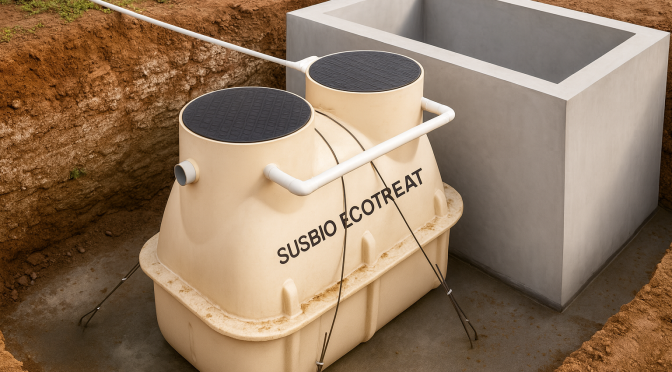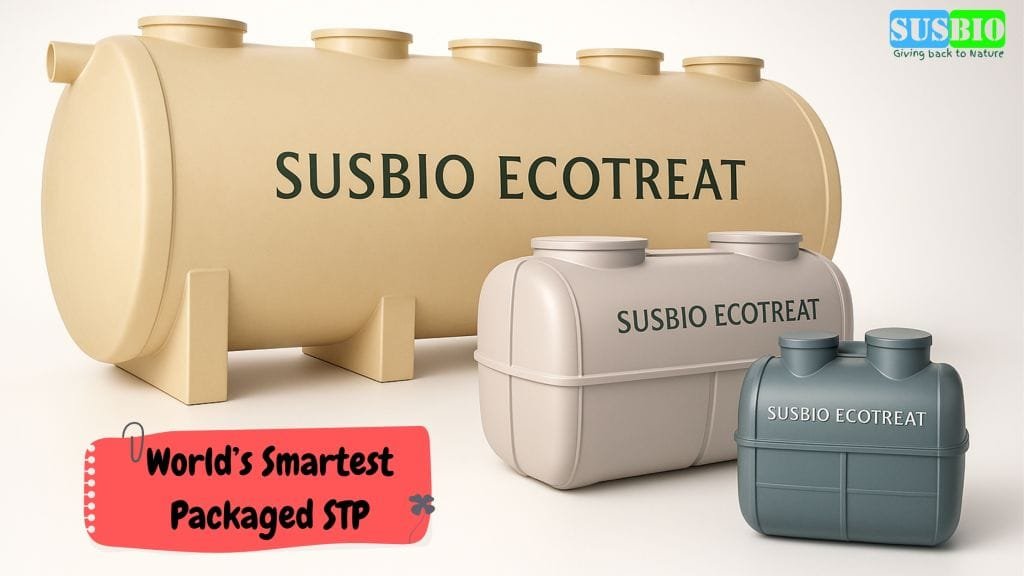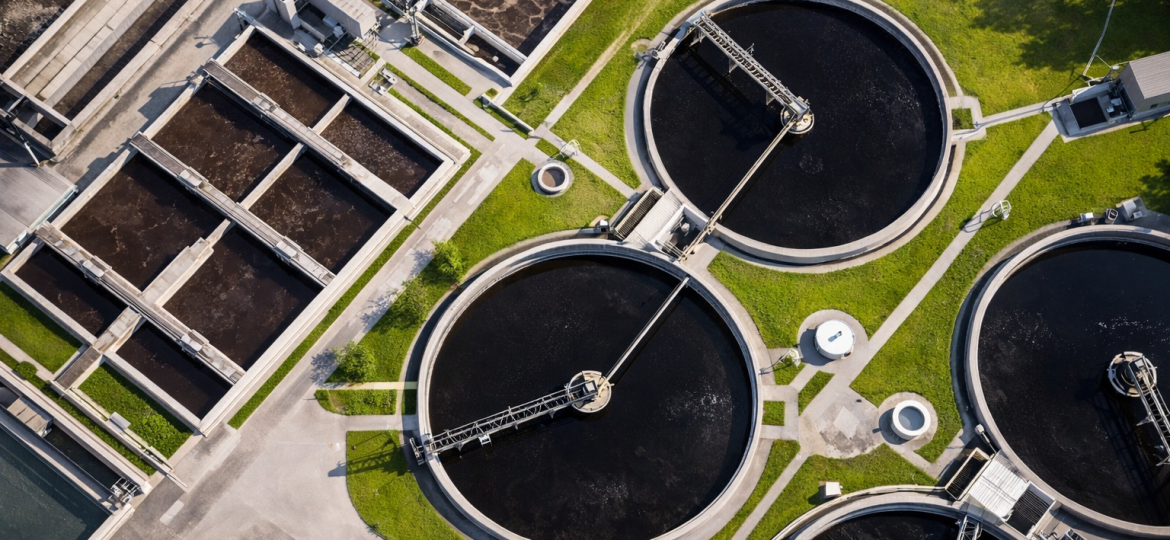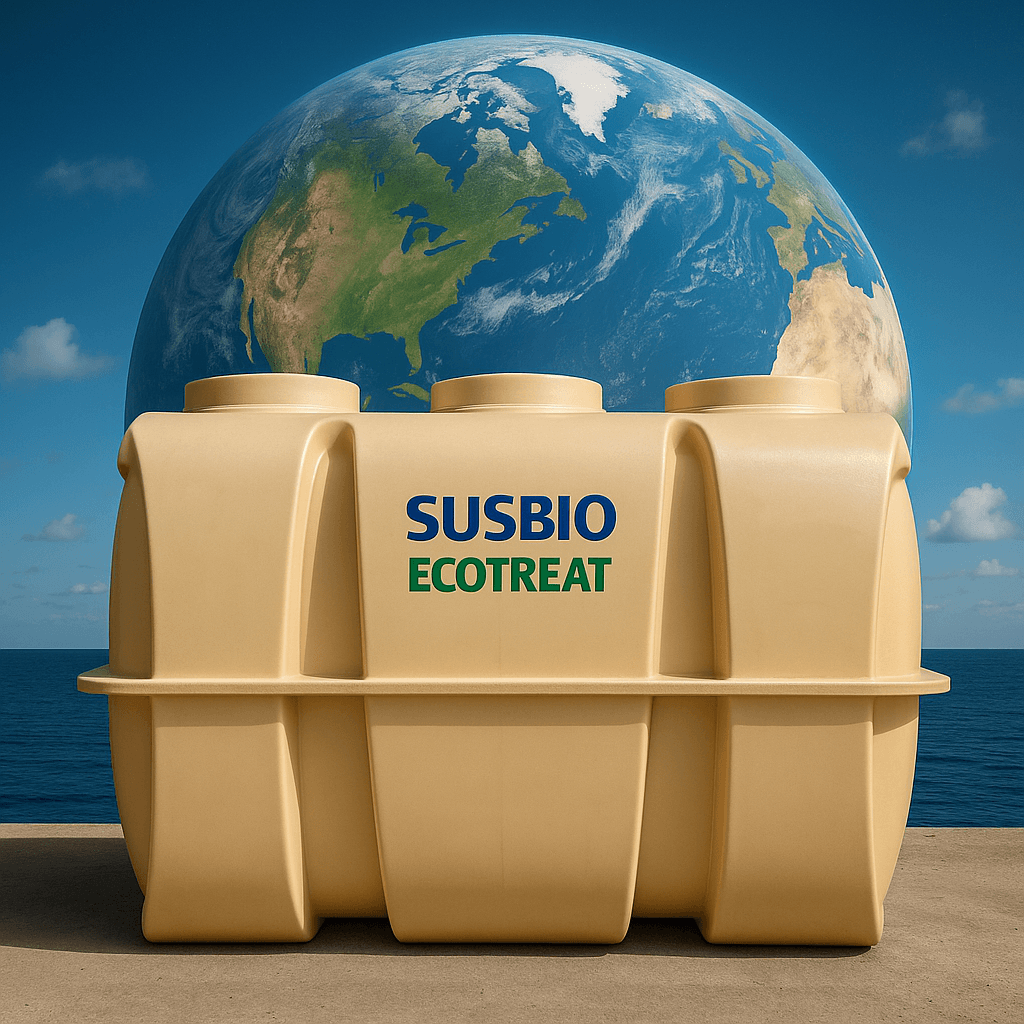A home sewage treatment plant can remove 80-90% of human waste and other solids after secondary treatment – quite impressive, isn’t it? Domestic wastewater treatment is a vital part of ensuring safe sewage disposal and maintaining water quality standards in 2025.
The rise of packaged sewage treatment plants provides an excellent solution for managing wastewater on-site. The term “packaged” refers to their pre-manufactured nature, which allows quick installation with minimal ground preparation. These domestic sewage treatment plants are built to process wastewater from single households and can serve 4 to 20 people.
The sewage treatment plant processes all types of wastewater that homes generate.
SUSBIO ECOTREAT emerges as India’s most advanced packaged STP in 2025, giving homeowners a future-ready solution that manages wastewater responsibly and efficiently.
Why 2025 Demands a Home Sewage Treatment Upgrade
Upgrading your home’s wastewater management system will be crucial by 2025. Environmental pressures and technological advances make packaged sewage treatment plants a better choice than traditional systems.
Rising Lack of Water in Urban and Rural Areas
India’s water availability per person has dropped from 1816 cubic meters in 2001 to 1486 cubic meters in 2021. Experts predict this number will fall to 1341 cubic meters by 2025. This puts India close to being labeled a “water stressed” nation. Almost two-thirds of the world’s population – about four billion people – face severe water shortages at least one month every year.
Every drop counts when water is scarce. Domestic sewage treatment plants let you recycle water for gardens and toilet flushing. This greatly reduces the need for fresh water. Recycled water from properly treated sewage helps ease water stress, lowers carbon footprints, and saves money.
Stricter Environmental Regulations for Domestic Wastewater
Governments across the world now enforce tighter rules for wastewater management. Homeowners must follow strict guidelines to prevent sewage from harming the environment. Breaking these rules can lead to heavy fines – up to £100,000 in some places.
New regulations don’t allow septic tank discharge into waterways. Water reuse requirements are becoming mandatory, especially for non-drinking purposes like toilet flushing.
Limitations of Septic Tanks in Modern Homes
Traditional septic tanks provide basic treatment compared to modern sewage treatment plants. They don’t deal very well with:
- Contamination risks: Old septic systems often contaminate groundwater and surface water
- Insufficient processing: Septic tanks can’t remove ammonia, which harms nature and wildlife
- Modern home demands: Today’s households create more waste than older systems can handle
SUSBIO ECOTREAT leads the way as India’s most advanced packaged STP solution. Its innovative technology removes about 95% of harmful contaminants. This makes it perfect for meeting current and future environmental standards.
How a Packaged Sewage Treatment Plant Works at Home

A packaged sewage treatment plant uses multiple sophisticated processes to turn raw sewage into clean, reusable water. Homeowners who understand these processes can better appreciate why they should install a domestic sewage treatment system.
Primary Treatment: Settling and Grease Removal
Raw wastewater first enters the primary treatment zone. The screening mechanisms filter out large debris like rags, sticks, and plastics. The water then moves slowly through a settling tank where heavy solids sink and create primary sludge. Oils and greases float to the surface where mechanical surface-skimming devices remove them. This process removes 50-70% of suspended solids and 25-40% of biochemical oxygen demand (BOD).
Secondary Treatment: Aerobic Breakdown in Aeration Chambers
The partially clean wastewater flows into aeration tanks after primary treatment. Diffusers at the bottom pump in air to create oxygen-rich conditions. Aerobic bacteria thrive in this environment and eat organic matter, which reduces pollutants by a lot. These bacteria create “activated sludge” – a biological floc made up of bacteria and protozoa. The process removes up to 80-90% of organic matter and nutrients, making it work better than primary treatment alone.
Tertiary Treatment: UV Disinfection and Polishing
The final purification happens during tertiary treatment before discharge. UV disinfection proves highly effective and eco-friendly among various disinfection methods. UV light banks damage microorganisms’ genetic structures as wastewater passes through, which stops them from multiplying. A low-pressure UV dose of 164 mWs/cm² cuts Total Coliform Count by 3 logs and eliminates Fecal Coliform, Pseudomonas, and Staphylococcus completely. The water meets strict environmental standards after this stage.
Return Activated Sludge (RAS) Cycle in Clarifiers
The Return Activated Sludge cycle plays a key role in sewage treatment. The mixture moves to a clarifier where activated sludge settles after secondary treatment. Some of this settled sludge goes back to the aeration tank to keep the right amount of microbes. This recycling helps maintain steady treatment efficiency and balanced microbial populations. The RAS cycle keeps a strong, active microbial community that breaks down organic pollutants effectively.
Final Discharge: Safe Effluent for Reuse or Disposal
The final effluent becomes safe to discharge or reuse after complete treatment. This clean water serves many purposes like irrigation, industrial processes, and groundwater recharge. Homeowners can use it to water gardens and flush toilets, which saves fresh water. SUSBIO ECOTREAT, India’s most advanced packaged STP, creates high-quality effluent that exceeds regulatory standards. This makes it an ideal solution for eco-conscious homeowners looking toward the future.
SUSBIO ECOTREAT: India’s Most Advanced Packaged STP
SUSBIO ECOTREAT stands as India’s most advanced packaged sewage treatment plant for home use through its innovative design and superior technology.
Compact Design with Integrated Lamella Clarifier
SUSBIO ECOTREAT features an integrated Lamella Clarifier that reduces footprint by up to 60% compared to conventional systems. The inclined plate settler design maximizes surface area and minimizes space requirements. This makes it perfect for urban homes where installation space comes at a premium.
Energy-Efficient Aeration and Low Power Consumption
The domestic sewage treatment plant runs at just 16-20 kWh/day for a 10 KLD unit. Its fine bubble diffusion system achieves oxygen transfer efficiency of 4-6% per meter depth. This leads to lower operating costs for homeowners.
GRP Construction for Corrosion-Free Longevity
Glass Reinforced Plastic construction forms the core of the entire system, which eliminates corrosion issues common in metal tanks. The corrosion-resistant material ensures service life beyond 25 years without any drop in performance.
Plug-and-Play Installation with Minimal Civil Work
SUSBIO ECOTREAT arrives pre-assembled, which cuts installation time by 70%. The packaged STP plant needs only a concrete base and connection points. This eliminates the need for extensive excavation work.
Modular Capacity: 10 to 100 m³/day for Homes and Villas
The system offers expandable solutions from 10 to 100 cubic meters daily capacity. This domestic water treatment plant suits both single-family homes and large villas. The modular design allows future expansion as needs grow.
Environmental and Cost Benefits of Domestic STPs
Domestic sewage treatment plants provide environmental and financial benefits that go way beyond simple wastewater management. These systems create value that helps both ecosystems and household budgets.
Reduced Groundwater Contamination Risk
Domestic sewage treatment plants protect groundwater from pollution. Raw sewage contains pathogens, chemicals, and toxins that can contaminate water supplies and damage communities. Domestic sewage disposal remains the biggest source of water pollution in India. A well-designed home sewage treatment plant stops these contaminants from seeping into soil and damaging groundwater resources. SUSBIO ECOTREAT uses advanced filtration technology to remove harmful substances before they reach groundwater aquifers.
Effluent Reuse for Gardening and Flushing
Packaged sewage treatment plants excel at water recycling. You can safely reuse treated wastewater for non-potable purposes like gardening, flushing, and landscaping. This method turns waste into a resource and creates a radical alteration from “use and throw” to “use, treat, and reuse”. Households can reduce their water bills by up to 50% each year through effective recycling. The CPCB now requires treated water reuse for non-potable purposes, especially toilet flushing.
Lower Sludge Generation and Disposal Costs
Modern packaged STP plants cut operational costs through better sludge management. Solids management typically costs about 40% of wastewater treatment facilities’ yearly operations. SUSBIO ECOTREAT’s innovative design produces less sludge while delivering excellent treatment results. Proper sludge treatment processes can reduce total sludge volume by 80%. This is a big deal as it means that disposal expenses drop from the usual ₹3,000-8,000 per ton for non-hazardous sludge.
Compliance with CPCB and Local Discharge Norms
The Central Pollution Control Board (CPCB) maintains strict standards for treated effluent quality. These standards require pH between 6.5-8.5, BOD ≤ 10 mg/L, and TSS ≤ 10 mg/L. SUSBIO ECOTREAT delivers better results than these requirements, ensuring complete compliance with national regulations. This compliance helps avoid penalties and protects rivers and lakes from pollution. SUSBIO ECOTREAT leads India’s packaged STP solutions with technology ready for stricter future regulations.
Conclusion
Water shortage and environmental challenges make packaged sewage treatment plants a vital investment for homeowners in 2025. This piece explores how domestic wastewater management has grown beyond traditional septic systems to meet modern needs.
Traditional septic tanks don’t deal very well with today’s strict environmental regulations. These systems don’t know how to process ammonia and other harmful substances, which creates risks for groundwater and surrounding ecosystems. Upgrading to advanced treatment solutions has become a necessity.
SUSBIO ECOTREAT leads the pack as India’s most advanced packaged STP. The system provides complete treatment through primary settling, aerobic breakdown, and UV disinfection. Its integrated Lamella Clarifier needs 60% less space, making it perfect for urban homes with space constraints. The energy-efficient design uses only 16-20 kWh/day for a 10 KLD unit, which cuts down operating costs by a lot.
The system’s biggest advantage is its ability to turn wastewater from an environmental problem into a valuable resource. Homeowners can safely reuse the high-quality effluent for gardening and toilet flushing. This cuts household water bills by up to 50% each year while helping conserve water.
The corrosion-free GRP construction will give a service life of more than 25 years. Plug-and-play installation removes the need for extensive digging. Homeowners get both quick installation and reliable long-term performance.
Environmental regulations keep getting stricter and water resources become scarcer. SUSBIO ECOTREAT offers a future-ready solution that goes beyond current CPCB standards. Advanced domestic sewage treatment technology protects our water resources and saves money through reduced water use and lower disposal costs.
Environmentally responsible wastewater management isn’t just about following rules—it reshapes the scene toward responsible resource management for future generations.
Key Takeaways
Installing a packaged sewage treatment plant in your home is becoming essential as water scarcity intensifies and environmental regulations tighten in 2025.
- Water crisis demands action: India’s per capita water availability dropped to 1486 cubic meters in 2021, making water recycling through home STPs crucial for conservation.
- Traditional septic tanks are inadequate: Modern packaged STPs remove 95% of contaminants compared to septic tanks’ basic treatment, ensuring compliance with stricter regulations.
- Advanced treatment process delivers results: Multi-stage treatment including primary settling, aerobic breakdown, and UV disinfection produces safe effluent for reuse.
- SUSBIO ECOTREAT offers superior technology: India’s most advanced packaged STP features 60% smaller footprint, energy-efficient operation at 16-20 kWh/day, and 25+ year lifespan.
- Significant cost and environmental benefits: Homeowners can cut water bills by 50% through effluent reuse while preventing groundwater contamination and reducing sludge disposal costs.
The shift from traditional septic systems to advanced packaged STPs represents more than regulatory compliance—it’s an investment in sustainable water management that protects both your finances and the environment for future generations.
Frequently Asked Questions
Q1. Why is a sewage treatment plant necessary for homes in 2025?
A sewage treatment plant is essential for homes in 2025 due to increasing water scarcity, stricter environmental regulations, and the limitations of traditional septic systems. It helps conserve water through recycling, prevents groundwater contamination, and ensures compliance with modern wastewater management standards.
Q2. How does a packaged sewage treatment plant work?
A packaged sewage treatment plant works through multiple stages: primary treatment for settling and grease removal, secondary treatment using aerobic bacteria to break down organic matter, and tertiary treatment with UV disinfection. This process effectively removes contaminants and produces safe, reusable water.
Q3. What are the benefits of installing a domestic sewage treatment plant?
Installing a domestic sewage treatment plant offers several benefits, including reduced water bills through effluent reuse, lower risk of groundwater contamination, compliance with environmental regulations, and decreased sludge generation and disposal costs. It also contributes to water conservation efforts.
Q4. Is it safe to live near a sewage treatment plant?
Modern packaged sewage treatment plants, like SUSBIO ECOTREAT, are designed to be safe for residential use. They effectively process wastewater without producing harmful emissions. However, it’s important to ensure proper installation and maintenance to prevent any potential issues.
Q5. How does SUSBIO ECOTREAT compare to traditional septic tanks?
SUSBIO ECOTREAT is significantly more advanced than traditional septic tanks. It offers superior contaminant removal (up to 95%), produces high-quality reusable effluent, has a compact design with integrated Lamella Clarifier, and features energy-efficient operation. Unlike septic tanks, it fully complies with modern environmental standards and offers long-term cost savings.






